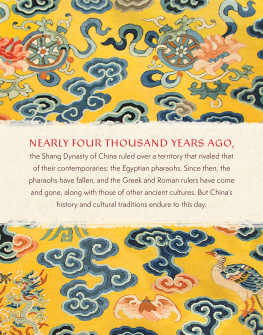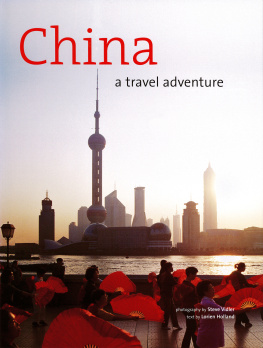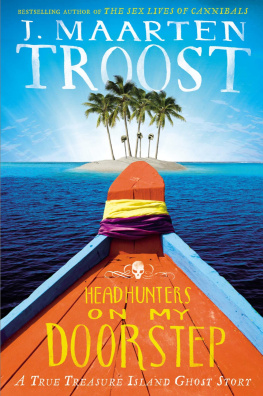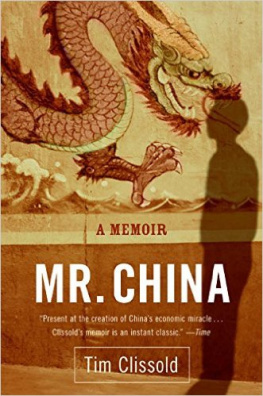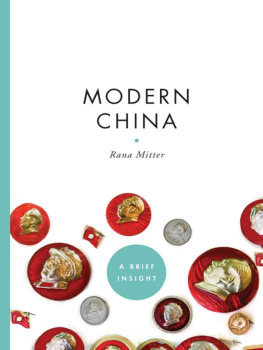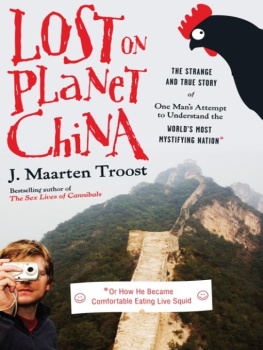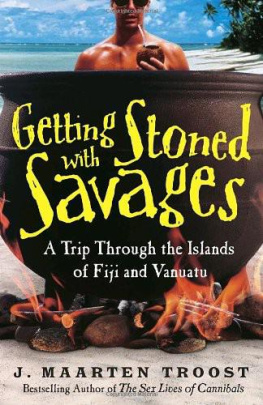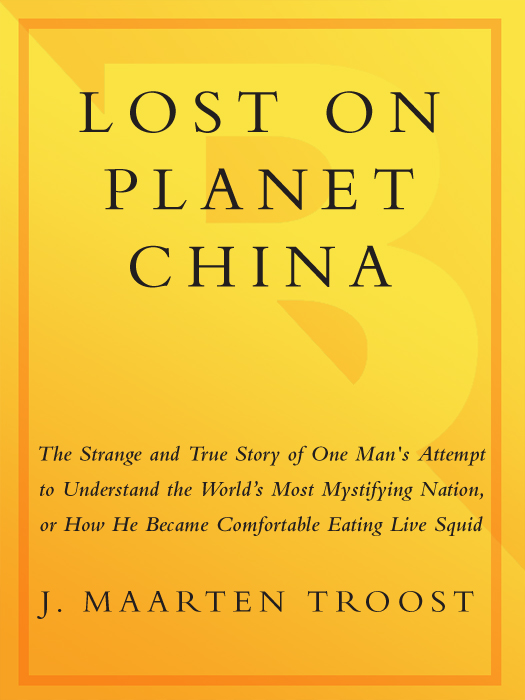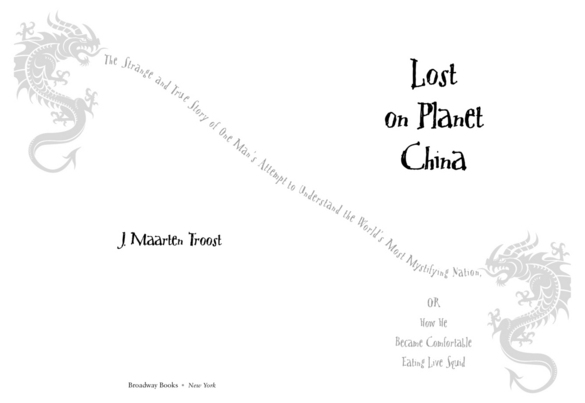Also by
J. M AARTEN T ROOST
The Sex Lives of Cannibals
Getting Stoned with Savages

PUBLISHED BY BROADWAY BOOKS
Copyright 2008 by J. Maarten Troost
All Rights Reserved
Published in the United States by Broadway Books, an imprint of The Doubleday Publishing Group, a division of Random House, Inc., New York.
www.broadwaybooks.com
BROADWAY BOOKS and its logo, a letter B bisected on the diagonal, are trademarks of Random House, Inc.
Map designed by Kevin Sprouls
Dragon illustration is adapted from an image by New Vision Technologies, Inc., Digital Vision/Getty Images
Library of Congress Cataloging-in-Publication Data
Troost, J. Maarten.
Lost on planet China : the strange and true story of one mans attempt to understand the worlds most mystifying nation, or how he became comfortable eating live squid / J. Maarten Troost.
p. cm.
1. ChinaSocial life and customs2002 2. ChinaDescription and travel. 3. ChinaHumor. 4. Troost, J. MaartenTravelChina. I. Title. II. Title: Strange and true story of one mans attempt to understand the worlds most mystifying nation, or how he became comfortable eating live squid.
DS779.43.T76 2008
915.1046dc22
2008011281
eISBN: 978-0-7679-3001-7
v3.1_r1
For my parents
Authors Note
One day, inside a coffeehouse, the author turned on his laptop and confidently typed the words Chapter One. Now what, he thought. He was supposed to write a book about China. This, after all, is what he had told people. So what are you working on now? theyd ask, and hed casually mention that he was working on a book about China. Really? theyd say, and stagger back in admiration. Surely, it requires fluency in Mandarin to write a book about China. But the author is not fluent in Mandarin. He can say hello in Mandarin Chinese, but not in Cantonese Chinese. He can, however, count to ten in Chinese, albeit with his hands. Well then, surely the author was at the very least in possession of vast amounts of scholarly knowledge about Chinaperhaps he had a Ph.D. in Chinese History from the Oriental Studies Program at Oxford, for example. After all, Chinese civilization is more than 5,000 years old. Only an expert could write a book about China, right?
The author wishes to acknowledge that he is not an expert on China. His academic expertise, such as it is, lies more toward Mitteleuropa than the Middle Kingdom. He does, however, know the difference between the Ming and the Qing dynasties and of this he is quite proud. But should you meet him, please do not ask him anything about the Song Dynasty. Or the Tang Dynasty. Or the Wu Dynasty. Please.
How then can this author, who neither speaks Chinese nor has any particular expertise regarding their history or culture, write a book, a biggish book, about China? This is the question that the author mulled inside the coffeehouse that day. He pondered the matter, turned it over, approached it from every angle. And finally he decided that there was only one way to do it. He would write honestly about China. He would write from the perspective of a guy who neither speaks Chinese nor has all that much knowledge pertaining to things Chinese, a guy who spent month after month just kind of wandering around this massive and rapidly changing country, without a plan, learning and experiencing life there.
The author does not read many travel books. True, he has sometimes been accused of being a travel writer. He has written about faraway places. But he was living in these faraway places, so technically, it wasnt travel writing; it was domestic writing. From his perspective, he has never done much travel writingat least not the kind you find in glossy magazines. In his experience, these magazines prefer to hear about the sunsets on some distant tropical isle, or how said island is an antidote to all the stresses of the continental world, rather than about how the author contracted typhoid while he was there (true), or how the islands young men are all signing up for the war in Iraq because their job prospects are so poor. The author doesnt like this kind of travel writing. Hed rather call it like it is. And so, since this is his book and he can do as he wishes, he has tried to write honestly about China. And he hopes that by writing honestly, that by sharing his experiences, readers might, in fact, get a sense of this vast and complex country. Because its important. We need to understand China. Really. Youll see. So there will be no fucking sunsets in the pages that follow.
Contents
1
T here are two kinds of people roaming the far fringes of the world: Mormon missionaries and Chinese businessmen. I know this because for a long while I lived off the map, flitting from island to island in the South Pacific, and invariably, just as I arrived at what surely was the ends of the earth, I would soon find myself in the company of Elder Ryan and Elder Leviticus, twenty-year-old kids from suburban Provo, who faced the challenging task of convincing islanders that they were not native islanders at all but lost Israelites. Not just lost Israelites, mind you, but lost and wicked Israelites. One would think that this would be a hard thing to convince people of, but the Mormons are persistent and today they can be found on even the most remote of islands. On Onotoa, an atoll of trifling size in the southern Gilbert group, and about as far as one can be on this planet without quite leaving it, I was startled to discover two Mormon missionaries, wearing their customary black pants and white short-sleeved dress shirts, complete with name tags, biking up and down the islands lonesome dirt path, searching for wayward souls to rescue. I also found them in Tonga, on the arresting islets of Vavau, and even in the rugged hills of Vanuatu. Whenever I encountered them, I immediately reached for a dose of caffeine, nicotine, or alcohol, something to demonstrate that conversion was a hopeless cause with me, and soon they were on their way, hustling errant Israelites.
Eventually, I grew accustomed to their presence. Missionaries, after all, have long been found in the worlds most distant corners. Where else would one find a tribe of lost and forgotten Hebrews? But as one year on the far side of the world passed into another, and then another, and another, until it seemed likely that my time on the islands would outlast Robinson Crusoes, I began to notice a different visitorthe Chinese businessman.
This, frankly, surprised me to no end, possibly because news travels slowly on the coconut wireless. No doubt in other parts of the world the presence of Chinese businessmencapitalists!would elicit nary a reaction. Mao Zedong had been dead for thirty years. China had moved on, changed, adapted, and eventually become the worlds factory. But if you live on an island where prices are still quoted in pigs, and where the news of the day is likely to involve two chiefs disputing each others lineage, you might not know this. You might, in fact, still believe that the Chinese pedal ancient black bicycles to their designated work unit, which is part of a cadre, though youre not quite sure what a cadre is. When you envision China, you might imagine factory workers, each waving a Little Red Book, marching in sync past enormous portraits of the Heroes of the Revolution. You can almost hear the loudspeakers, the voices exhorting the proletariat to strive ever further, so that the goals of the Five-Year Plan are attained. You can imagine little children, all wearing red handkerchiefs around their necks, learning to despise imperialist dogs and debauched class enemies. This is what happens when you live in a place far, far away, thousands of miles from a continent. Nothing ever changes on an island, and you assume that the continental world, too, has resolved to cease spinning. But it hasnt, of course, and one day you discover that youre sharing an odd, faraway island with a businessman from China.


